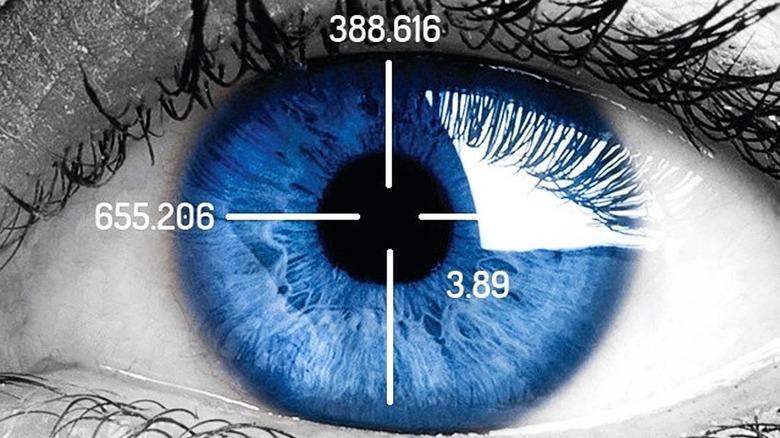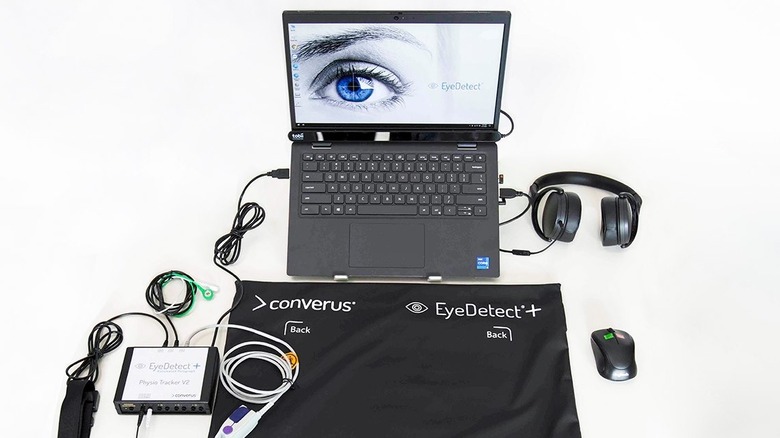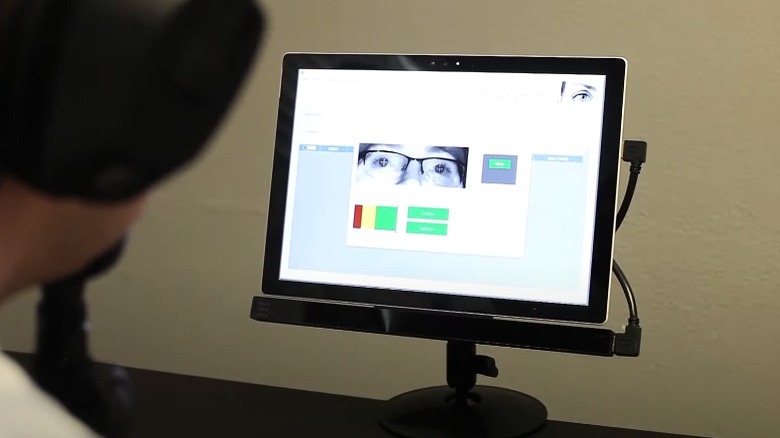Your Eyes Can't Lie To This New Technology
A company from Utah is gaining recognition with a new tech they assure can detect lies in 15 to 30 minutes by analyzing involuntary eye movement. From TV series like "Lie to Me" — based on clinical psychologist Dr. Paul Ekman (via PaulEkman Group) — to the body language analysis in the 2022 Johhny Depp versus Amber Heard defamation trial (via New York Post), catching a person in a lie seems to be a modern American obsession.
Technology working in search of the truth is not new, as the nearly 100-year-old polygraph can attest. Most people have a general idea of how a polygraph works, whether they've seen one used in a movie or have been subject to the use of the test themselves. According to the APA, the average polygraph machine consists of "a physiological recorder that assesses three indicators of autonomic arousal: heart-rate/blood pressure, respiration, and skin conductivity."
But what if a person could be found lying or telling the truth based on analyzation of a video recording of their eyes?
How does EyeDetect work?
Todd Mickelsen is the CEO of Converus, the company that developed and commercializes EyeDetect and EyeDetect+, a system that can apparently judge truthfulness in a person based on video footage. According to Desert News, Mickelsen suggests he has caught a variety of high-ranking government officials telling lies. His list includes all four Utah members of the U.S. House of Representatives, the undersecretary of the Department of Defense, the former domestic policy adviser for former vice-president Mike Pence, and numerous members of Congress, senators, FBI, and CIA officials.
Converus suggests that their EyeDirect technology is 86-88% accurate in detecting lies in a human subject. To utilize the tech, a subject will sit in front of a computer and take an automated test with questions that can be answered "true" or "false." The test uses an infrared eye-tracking camera to record and analyze eye movements. Every second, this test can register up to 60 measurements of involuntary eye behaviors. Involuntary eye behaviors include — but are not limited to – changes in pupil diameter, eye movement, blinks, and fixations. Once the video of eye movements has been captured, the program processes the data and in less than five minutes scores a person as deceptive or truthful.
Cognitive load
EyeDetect can execute a 15-minute test called Directed Lie Comparison, or a 30-minute test called Multi-issue Comparison Test. Traditional polygraph examinations can last anywhere from 90 minutes to five hours, with final results taking as long as several weeks to be delivered.
"You exert more mental effort to lie — scientists refer to it as 'cognitive load' — than when you tell the truth, and you experience some involuntary changes," said Converus CEO Todd Mickelsen (via Utah Business). "Your pupils dilate up to a 10th of a millimeter. It's something you can't see with the naked eye."
Mickelsen assures that its special camera and software can pick up eye behaviors that happen in just milliseconds. The company says they have over 600 customers in 50 countries, and they operate in 50 languages. The company suggests that its main avenue of business with the EyeDirect system is to analyze individuals for involvement in drug use, robbery, sexual assault, infidelity, murder, sabotage, espionage, terrorism, and other criminal and unethical behaviors. Their customers are mostly law enforcement, attorneys, private investigators, and clergy.
Above you'll see a clip from the original "Blade Runner" movie, in which investigators have a test that monitors involuntary eye movements to detect whether their subject is human or synthetic.
Why experts are not sold on lie detectors
BBC reported back in January 2022 that not everyone was pleased with lie detection technology. Former CIA officer Christopher Burgess explained that lie detectors should not be used as the end-all for proving the guilt or innocence of criminals or spies. The Washington Post reported that experts have shown skepticism in the tech in EyeDetect tests, just as they've shown skepticism in lie detection with the polygraph. It's important to note here that the polygraph has been banned from use in a wide variety of ways in the United States, courtesy of the Employee Polygraph Protection Act (EPPA).
"People have been trying to make these predictions for a long time," Leonard Saxe, a psychologist at Brandeis University and expert in lie detection research told The Washington Post. "But the science has not progressed much in 100 years." Despite not having reviewed EyeDetect, nor the tech behind it, Saxe added; "I don't know of any evidence that eye movements are linked to deception." The Washington Post revealed that the scientific mind behind EyeDetect is John Kircher, a retired professor at the University of Utah, that has been funded by the Defense Department and consulted with the CIA.
Laurie Levenson, a law professor at Loyola Marymount University, said that screening people for job applications, or holding people accountable for things they have not done based on false positives is a matter of concern. She also warned that false negatives could benefit the guilty. The ethical and legal implications of lie detection technology and its consequences are highly significant.
From law enforcement to private companies and government agencies, experts are concerned that artificial intelligence-based tests may lead the courts, justice, and society astray. Given the seriousness of the potential issues at hand, 88% accuracy becomes less of a scientific breakthrough and more of a matter best described by basketball player Frank Robinson: "Close only counts in horseshoes and hand grenades."


